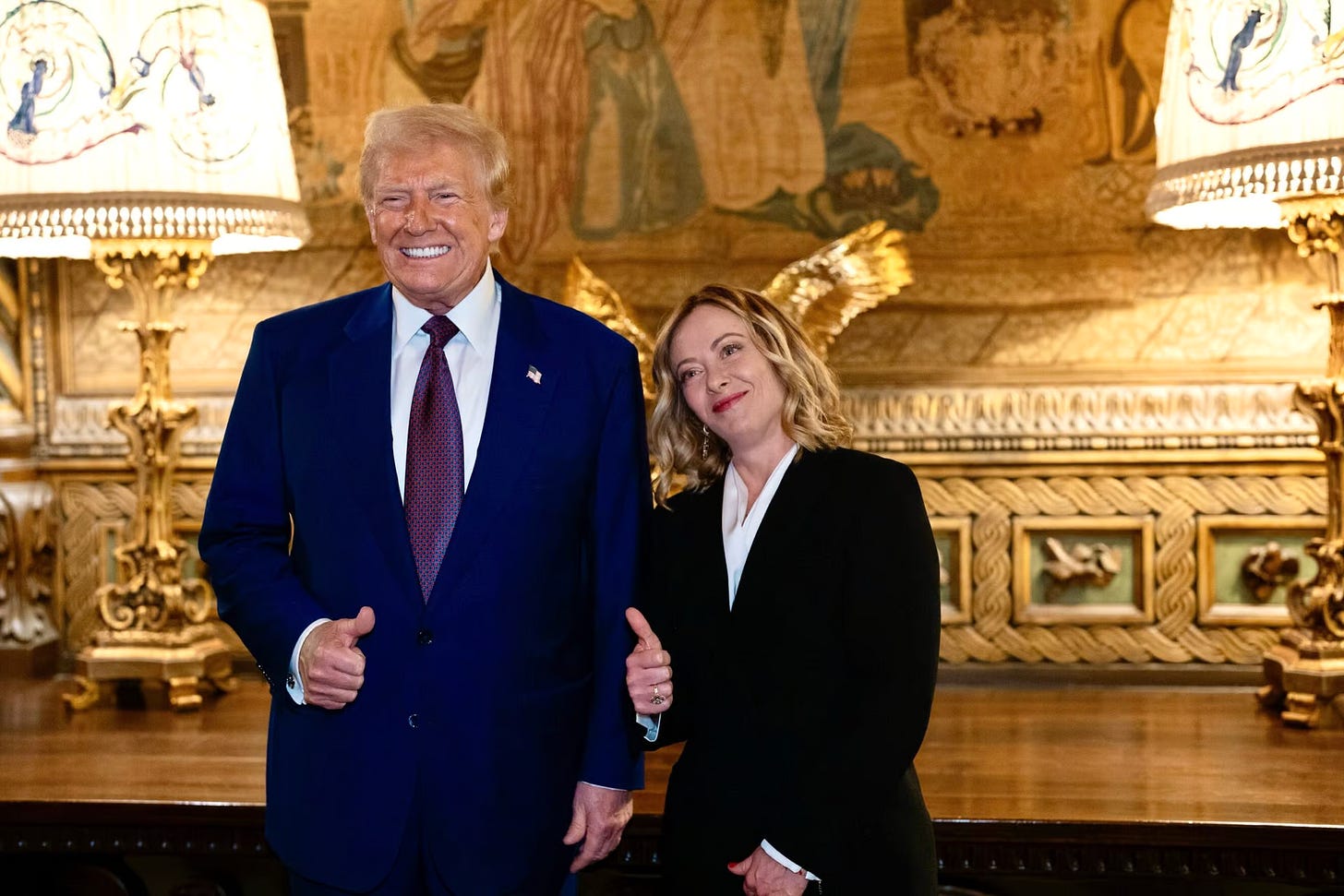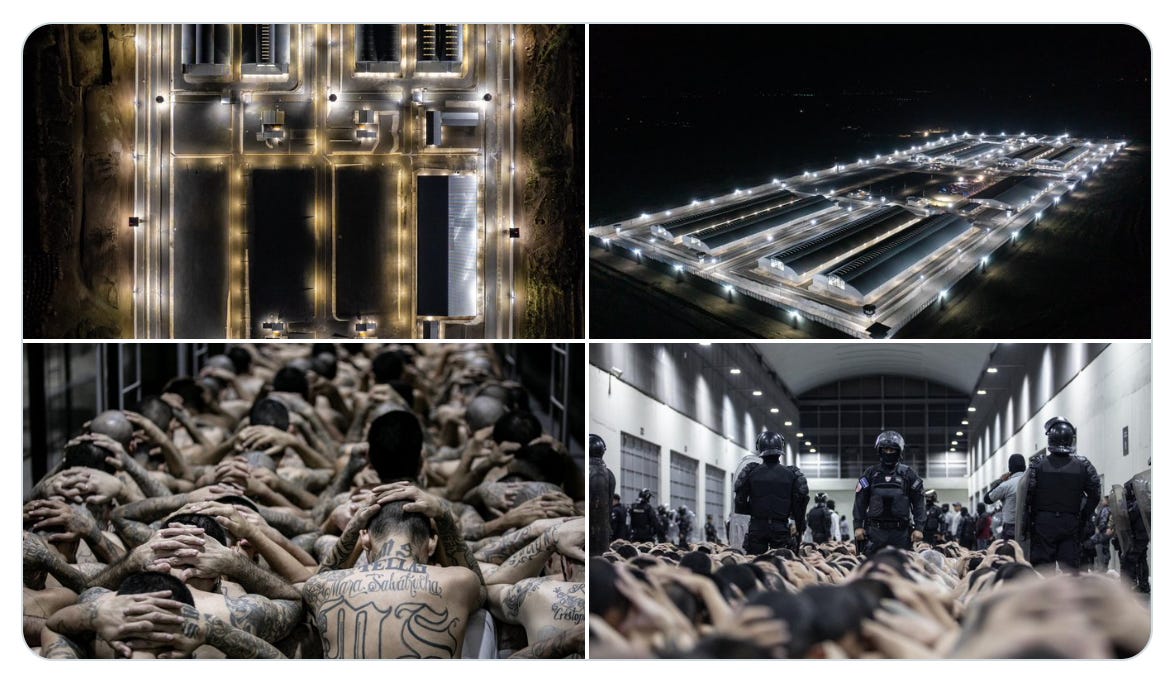The New Fascist International
A growing club of far-right, hardline nationalist, and fascist political leaders is working hard to transform the world. They must be opposed.
Is fascism today essentially internationalist—or is it made up of a series of discrete, nationally bounded projects?
Looking around the world today, it’s hard to escape the sense that fascism has become an internationalist project and one that transcends familiar geopolitical blocs and transnational coalitions: The new Fascist International cuts across NATO and BRICS, the West and the Global South, drawing in actors from all major geopolitical camps to form a multinational coalition of far-right, hardline nationalist, fascist-adjacent and outright fascist political actors.
Congealing around a set of shared ideological commitments, the movement encompasses leaders and governments ranging from Javier Milei’s Argentina, Meloni’s Italy, Israel’s Netanyahu government, Hungary (Orbán), the United States (Trump), India (Modi), and Putin’s Russia, to name its most visible exponents. But in addition, there are (sizeable) parties vying for power, like Germany’s Alternative für Deutschland (AfD), polling in second place ahead of Germany’s 2025 federal elections, and one-time leaders like Brazil’s Jair Bolsonaro or the Philippines’ Rodrigo Duterte.
Xi’s China occupies a more ambiguous position vis-à-vis this new axis, even as it remains undoubtedly authoritarian, with the treatment of Xinjiang’s Uyghurs constituting a serious human rights violation, to take just one example. China’s position as the world’s second-place economic power and its distinctive ideology—a Confucian-inflected “Marxist Nationalism,” to use Kevin Rudd’s descriptor, coupled with an advanced form of neoliberal capitalism—make it something of a case unto itself: It announced a “no-limits friendship” with Putin’s Russia, to be sure, but has since backpedaled to a degree; and it is locked in an antagonistic economic relationship with the Trump II administration, one of the “superspreaders” of global fascism.
Of course, a present-day Fascist International doesn’t involve a literal organization acting in unified, lockstep fashion. Instead, the term draws inspiration from the historical attempt by elements within Mussolini’s regime to form a “fascist international,” in an attempted imitation of the Communist International, exemplified by a 1934 conference in Montreux, Switzerland hosted by the Mussolini-affiliated Action Committee for the Universality of Rome (CAUR). Instead, today’s Fascist International is characterized by what Ludwig Wittgenstein termed a “family resemblance.” In his Philosophical Investigations, Wittgenstein writes that the concept denotes the “various resemblances between members of a family: build, features, color of eyes, gait, temperament, etc. etc. [that] overlap and criss-cross in the same way.”
So, too, with the global family of far-right, hardline nationalist, and fascist leaders: Their commonalities give rise to certain affinities—a generally shared alignment—rather than any perfectly synchronized coordination. Like in all families, there will be differences and even outright conflicts; still, its members feel the bonds of their family resemblance, orienting their ideas and inclinations, both domestically and on the world stage, to a shared ideological purpose. Little wonder, then, that Trump’s first invitee at the outset of his second term was Israel’s Prime Minister Netanyahu, with India’s Modi set to follow close behind.
What are the common denominators of this increasingly self-assertive, global ideological formation? They include (i) an emphasis on strongman leadership and rule by “states of exception,” (ii) the ever-present threat and actual use of both (military) force and economic coercion to realize a nation-centered agenda, (iii) hardline (ethno)nationalism, fueling rampant xenophobia targeting out-groups and designated “common enemies,” (iv) aggressive propaganda campaigns aimed at spreading traditionalist, reactionary notions about gender, race, sexuality, and religion, and relatedly, (v) a deep preoccupation with the body, above all women’s bodies, and the (heterosexual) family, as well as biological and therefore social reproduction.
Fascism is an ideology of selective life and targeted death. It elevates particular social groups that it deems worthy of the gifts of societal support, welfare, life, and joy—while other portions of the population it devalorizes and deems unworthy, stigmatizing, criminalizing, or ejecting those regarded as social refuse from the body politic, at the utmost limit dehumanizing and subjecting such categories to (lethal) violence. As Jason Stanley points out in How Fascism Works,
The dangers of fascist politics come from the particular way in which it dehumanizes segments of the population. By excluding these groups, it limits the capacity for empathy among other citizens, leading to the justification of inhumane treatment, from repression of freedom, mass imprisonment, and expulsion to, in extreme cases, mass extermination.
In this sense, Gaza is but the laboratory of fascism (though underwritten and armed by Biden’s Democratic administration for some 16 months), its terrain devastated by an extreme right-wing government; Gaza offers a clear demonstration of fascism’s capacity to inflict death on a captive people even in the twenty-first century. Gaza is a premonition, a potential future, as we face the globalization of extreme nationalisms, a paradoxical agglomeration of movements and leaders that, on the one hand, glorify their own Nation and the People said to belong to its Soil, and, on the other hand, seek out a perverted form of international solidarity—allies with which to bond, commiserate, and bolster their ideological cause.
This does not mean that the Fascist International cannot be resisted or that its victory is in any sense guaranteed: Its endpoint is far from necessary in any ontological-historical sense. But if its paroxysms of violence are to be avoided, the new fascisms of our age, wherever they may appear, must be resisted with every ounce of our strength and using all peaceful means available to people of good will—as activists and intellectuals, labor unions and political parties, religious groups and NGOs. The Fascist International has the potential to produce untold catastrophes; there can be no compromising with this dark and disturbing force that once again threatens to overshadow the world, now technologically augmented and globalized like never before.
TheoryLinks
Thank you for reading The Theory Brief.
This week has been dominated by the actions of the Trump administration, now in its third week. Here are some notable recent events and news stories:
Asylum seekers to Guantànamo Bay
The Trump administration plans on sending 30,000 migrants to Guantánamo Bay, and the first planeload of “illegal immigrants” departed Tuesday. Trump’s policies are already having real consequences for tangible people.
A U.S. sovereign wealth fund?
On Monday, Trump announced plans to establish a U.S. sovereign wealth fund (SWF), modeled on countries like Saudi Arabia that have stashed trillions of dollars worth of budget surpluses and natural-resource earnings in dedicated state-owned investment funds.
The basic problem Trump’s proposed fund faces is: Where would the money come from? As the Times points out,
[T]he United States runs persistent, and widening, budget deficits, and it is unclear where the Trump administration could find the money to seed such a fund.
Any money borrowed to fund it would be more sensibly spent on reducing the federal budget deficit ($1.83 trillion in 2024) or paying off the national debt of $36.2 trillion. If the fund does become a reality, the U.S. federal government will likely have to borrow heavily to fill it.
That’s terrible economics—all in the service of strongman posturing.
El Salvador’s president Bukele’s prison proposal
In a post on X, enthusiastically retweeted by Elon Musk, El Salvador’s law-and-order, hard-right president Nayib Bukele announced that the country was offering the United States the “opportunity to outsource part of its prison system.” Bloomberg reports on Bukele’s meeting with U.S. Secretary of State Marco Rubio on Monday:
He told Rubio that El Salvador would be willing to accept deportee criminals of any nationality — US citizens included — into the nation’s biggest industrial-size prison built specifically to house gang members.
Bukele’s crackdown on crime in El Salvador has made the country one of the most punitive societies in recent history, incarcerating some 2 percent of the population.
The images Bukele used to advertise the announcement on X could pass for a series of stills from a dystopian film, now becoming reality:
Ethnically cleansing Gaza
Trump has shocked the world by offering to occupy Gaza in a meeting with Netanyahu. The Times headline says it all: “Trump Proposes U.S. Takeover of Gaza and Says All Palestinians Should Leave.”
“The U.S. will take over the Gaza Strip, and we will do a job with it too,” Mr. Trump said at a news conference Tuesday evening. “We’ll own it and be responsible” for disposing of unexploded munitions and rebuilding Gaza into a mecca for jobs and tourism. Sounding like the real estate developer he once was, Mr. Trump vowed to turn it into “the Riviera of the Middle East.”
This is ethnic cleansing, plain and simple.
Tariffs on Canada postponed—and a pipeline to Asia
With Canada’s expanded Trans Mountain pipeline completed in May 2024, Canada can now move an additional 590,000 barrels of crude oil a day from inland Edmonton to the British Columbia coast, and from there to refineries in Asia, Reuters reports.
In announcing a series of tariffs on Canadian imports, Trump seemingly handed Asian refineries a win, energy analyst Amrita Sen said on Bloomberg TV earlier this week, as Trump’s tariffs would likely cause Canadian suppliers to shift oil exports from U.S. refineries in the Gulf of Mexico to Asia.
Trans Mountain is controversial for its environmental impacts and effects on Indigenous populations, but shows that Canada is prepared to rethink its relationship with its southern neighbor:
“Everybody is of the view that we have to rethink a little bit some of the vulnerabilities we’ve got, vis-a-vis the United States,” Natural Resources Minister Jonathan Wilkinson said in an interview.






Yes, there is an irony that 50 shades of far-right have learned how to cooperate with each other not in order to solve global problems and challenges but more to preserve the nation-states through the global divide of humans. I am active in Democracy Without Borders and from my experience, there is a lot of room and need for improvement for cooperation regarding all networks, organizations and communities who want to create an united world with common institutions and laws for the planet
Thank you for your provocative reflection. I cannot help regarding fascism, like communism, as a late 19th/early 20th century phenomenon, and think that there might be something to be gained from examining and ordering the commonalities of these two historical formations. I have always found Foucault's analysis of bio-political governmentality useful in this regard. I also think that there is something important in neo-conservative discussions of totalitarianism that may be helpful in drawing out the ways in which the subject constituted by the contemporary authoritarian reaction differs fundamentally from older formations such as fascism and communism. Today's economy operates in ways that are fundamentally different to those of the late 19th/early 20th century.